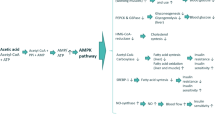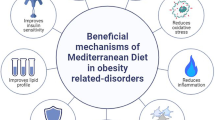Abstract
Purpose
Fenugreek seeds (Trigonella foenum-graecum L.) have long been used as a herbal medicine for treating metabolic and nutritive dysfunctions. They have been shown to modulate feeding behaviour in animals. We have recently observed a selective decrease in fat consumption in healthy normal weight volunteers treated with a hydro-alcoholic seed extract. However, strong clinical data on the effects of fenugreek seeds on energy intake are lacking, especially in overweight individuals. The aim of our study was to investigate the effects of a repeated administration of a fenugreek seed extract on the eating behaviour of overweight subjects.
Methods
Thirty-nine healthy overweight male volunteers completed a 6-week double-blind randomized placebo-controlled parallel trial of a fixed dose of a fenugreek seed extract. Main endpoints were energy intake (dietary records and meal test), weight, fasting and post-absorptive glucose and insulin, appetite/satiety scores and oxidative parameters.
Results
Daily fat consumption, expressed as the ratio fat reported energy intake/total energy expenditure (fat-REI/TEE), was significantly decreased in our overweight subjects administered the fenugreek seed extract relative to those receiving the placebo (fat-REI/TEE 0.26 ± 0.02 vs. 0.30 ± 0.01, respectively; P = 0.032). We also observed a significant decrease in the insulin/glucose ratio in subjects treated with fenugreek seed extract relative to the placebo group (0.89 ± 0.09 vs. 1.06 ± 0.10 mUI mmol−1, respectively; P = 0.044). No significant effect was observed on weight, appetite/satiety scores or oxidative parameters.
Conclusion
The repeated administration of a fenugreek seed extract slightly but significantly decreased dietary fat consumption in healthy overweight subjects in this short-term study.

Similar content being viewed by others
References
Sauvaire Y, Petit P, Baissac Y, Ribes G (2000) Chemistry and pharmacology of fenugreek. In: Mazza G, Oomah BD (eds) Herbs, botanicals and teas. Technomic, Lancaster, pp 107–129
Ravikumar P, Anuradha D (1999) Effect of fenugreek seeds on blood lipid peroxidation and antioxidants in diabetic rats. Phytother Res 13:197–201
Choudhary D, Chandra D, Choudhary S, Kale RK (2001) Modulation of glyoxalase, glutathione S-transferase and antioxidant enzymes in the liver, spleen and erythrocytes of mice by dietary administration of fenugreek seeds. Food Chem Toxicol 39:989–997
Rguibi M, Belahsen R (2006) Body size preferences and sociocultural influences on attitudes towards obesity among Moroccan Sahraoui women. Body Image 3:395–400
Petit P, Sauvaire Y, Ponsin G, Manteghetti M, Fave A, Ribes G (1993) Effects of a fenugreek seed extract on feeding behaviour in the rat: metabolic-endocrine correlates. Pharmacol Biochem Behav 45:369–374
Petit PR, Sauvaire YD, Hillaire-Buys DM, Leconte OM, Baissac YG, Ponsin GR, Ribes GR (1995) Steroid saponins from fenugreek seeds: extraction, purification, and pharmacological investigation on feeding behavior and plasma cholesterol. Steroids 60:674–680
Udayasekharan Rao P, Sesikeran B, Srinivasa Rao P, Nadamuni Naidu A, Vikas RV, Ramachandran EP (1996) Short term nutritional and safety evaluation of fenugreek. Nutr Res 16:1495–1505
Handa T, Yamaguchi K, Sono Y, Yazawa K (2005) Effects of fenugreek seed extract in obese mice fed a high-fat diet. Biosci Biotechnol Biochem 69:1186–1188
Chevassus H, Molinier N, Costa F, Galtier F, Renard E, Petit P (2009) A fenugreek seed extract selectively reduces spontaneous fat consumption in healthy volunteers. Eur J Clin Pharmacol In press
Black AE, Coward WA, Cole TJ, Prentice AM (1996) Human energy expenditure in affluent societies: an analysis of 574 doubly-labelled water measurements. Eur J Clin Nutr 50:72–92
Goldberg GR, Black AE, Jebb SA, Cole TJ, Murgatroyd PR, Coward WA, Prentice AM (1991) Critical evaluation of energy intake data using fundamental principles of energy physiology: 1. Derivation of cut-off limits to identify under-recording. Eur J Clin Nutr 45:569–581
Hill AJ, Magson LD, Blundell JE (1984) Hunger and palatability: tracking ratings of subjective experience before, during and after the consumption of preferred and less preferred food. Appetite 5:361–371
Raben A, Tagliabue A, Astrup A (1995) The reproducibility of subjective appetite scores. Br J Nutr 73:517–530
Yagi K (1976) A simple fluorometric assay for lipoperoxide in blood plasma. Biochem Med 15:212–216
Witko-Sarsat V, Gausson V, Nguyen AT, Touam M, Drueke T, Santangelo F, Descamps-Latscha B (2003) AOPP-induced activation of human neutrophil and monocyte oxidative metabolism: a potential target for N-acetylcysteine treatment in dialysis patients. Kidney Int 64:82–91
Jackson B, Dujovne CA, DeCoursey S, Beyer P, Brown EF, Hassanein K (1986) Methods to assess relative reliability of diet records: minimum records for monitoring lipid and caloric intake. J Am Diet Assoc 86:1531–1535
Johansson L, Solvoll K, Bjorneboe GE, Drevon CA (1998) Under- and overreporting of energy intake related to weight status and lifestyle in a nationwide sample. Am J Clin Nutr 68:266–274
Smith BK, York DA, Bray GA (1999) Activation of hypothalamic serotonin receptors reduced intake of dietary fat and protein but not carbohydrate. Am J Physiol 277:R802–811
Goldfield GS, Lorello C, Doucet E (2007) Methylphenidate reduces energy intake and dietary fat intake in adults: a mechanism of reduced reinforcing value of food? Am J Clin Nutr 86:308–315
Sharma RD, Sarkar A, Hazra DK, Misra B, Singh JB, Maheshwari BB (1996) Toxicological evaluation of fenugreek seeds: a long term feeding experiment in diabetic patients. Phytother Res 10:519–520
Madar Z, Abel R, Samish S, Arad J (1988) Glucose-lowering effect of fenugreek in non-insulin dependent diabetics. Eur J Clin Nutr 42:51–54
Broca C, Breil V, Cruciani-Guglielmacci C et al (2004) Insulinotropic agent ID-1101 (4-hydroxyisoleucine) activates insulin signaling in rat. Am J Physiol Endocrinol Metab 287:E463–E471
Acknowledgements
This study was sponsored by the University Hospital of Montpellier (UF7698) with the financial support of French Ministry of Health (PHRC régional 2001) and Laboratoires Legras (Cachan, France). We specially thank B Bories-Azeau (administrative assistant) for her extensive work concerning volunteers recruitment and study management. This study was also successfully carried out thanks to the expert scientific, medical, technical and logistic assistance of JL Allaz, AM Barbanel, R Blanc, A Bonardet, A Cadène, JP Cristol, M Escoffier, J Foppolo, P Jonquet, C Montaudié, A Mouraret, C Piat, MC Picot, G Pouly, AM Puech-Cathala, I Roch-Torreilles, MH Rocolle and H Tsiambakaïna.
Author information
Authors and Affiliations
Corresponding author
Rights and permissions
About this article
Cite this article
Chevassus, H., Gaillard, JB., Farret, A. et al. A fenugreek seed extract selectively reduces spontaneous fat intake in overweight subjects. Eur J Clin Pharmacol 66, 449–455 (2010). https://doi.org/10.1007/s00228-009-0770-0
Received:
Accepted:
Published:
Issue Date:
DOI: https://doi.org/10.1007/s00228-009-0770-0




